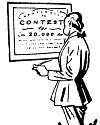|
By the
end of the 17th Century, pendulum clocks for use on land
were very well developed, but there was no instrument that would keep
time at sea. Without such a clock or watch, it is extremely difficult
for a ship to know its position.
 The need for such a timepiece was so
important that, in 1714 - through The Board of Longitude - the English
Government offered a prize of $100,000.00 for a practical method of
determining a ship's position. A young Englishman - by the name of John
Harrison - heard about this prize and decided to try for it.
The need for such a timepiece was so
important that, in 1714 - through The Board of Longitude - the English
Government offered a prize of $100,000.00 for a practical method of
determining a ship's position. A young Englishman - by the name of John
Harrison - heard about this prize and decided to try for it.Harrison - when only twenty-two - had made a clock out of wood. In 1728, he took some drawings of a new design to London and showed them to Graham, a noted clock-maker, who urged him to build one in metal. For seven years, he worked on this - and as the result of a test, he was given $2,500.00, to carry on his work. Starting in 1739 he built three more models, and in 1761 - twenty-two years later - Harrison showed The Board of Longitude his fourth model which he considered ready for actual trial. |








